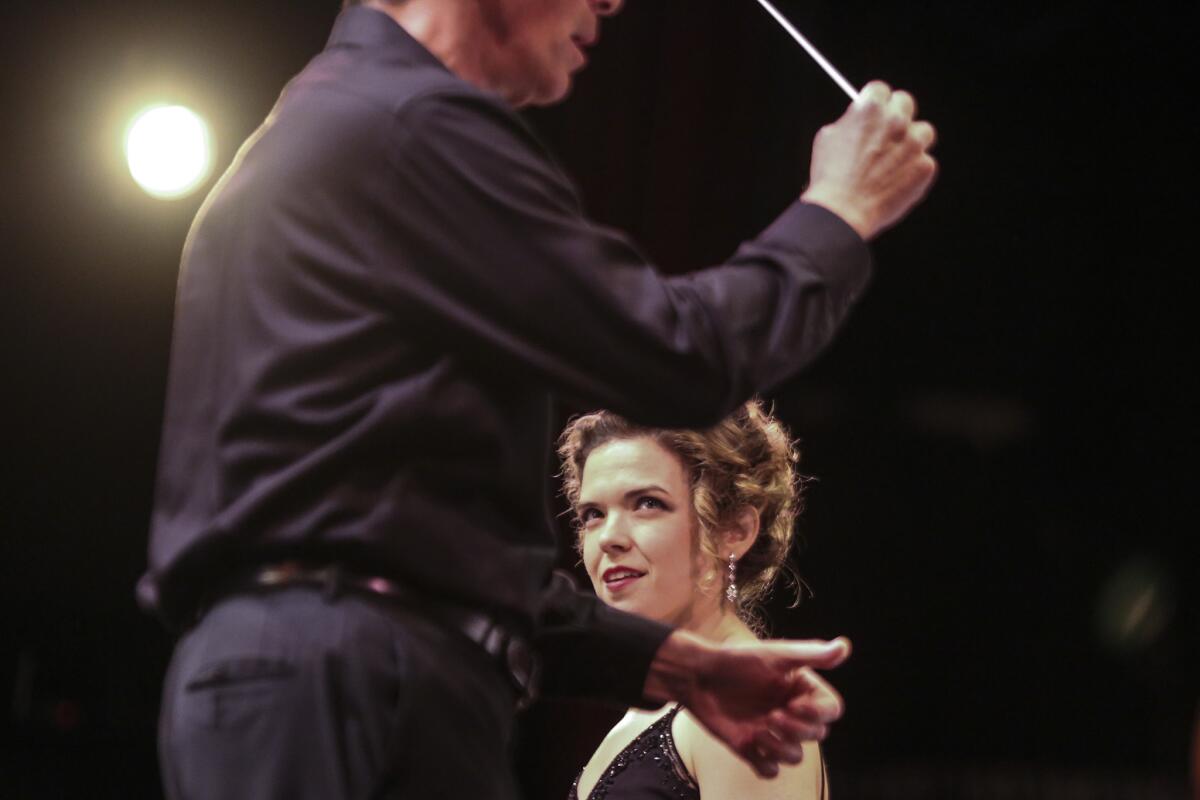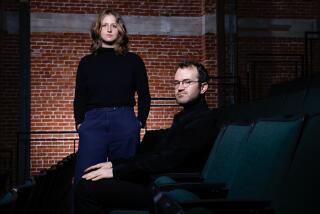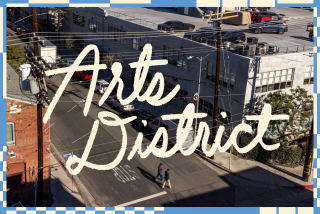Review: Hear Now Music Festival reveals the essence of Los Angeles new music -- we do as we please

Soprano Justine Aronson at the Hear Now Music Festival in Los Angeles.
The Hear Now Music Festival, devoted to composers who live in and around Los Angeles, can seem neither here nor there.
There isn’t much of an agenda. Nearly all the works, which began with an orchestra concert Thursday at UCLA and continue with chamber and solo pieces in three concerts in Santa Monica and Venice on Saturday and Sunday, are auditioned anonymously by a range of performers, including members of the Los Angeles Philharmonic, Los Angeles Chamber Orchestra and quite a few of the top new-music stalwarts in town.
What this tells us about Los Angeles is up to us to figure out. The program book has a welcoming note by artistic director Hugh Levick, who founded the festival six years ago, mainly giving thanks to supporters. That’s that.
Do we have a style or sound or even history? Is there a new-music center in a town without a center? Who’s hot and who’s not? It could be that the essence of Los Angeles new music (unlike in L.A.’s popular-culture industry) is that we have no business asking those questions. We do as we please.
See more of Entertainment’s top stories on Facebook >>
What I found fascinating about the Hear Now orchestra program, a first for the festival and a promising new collaboration with the UCLA Philharmonia, is just how radically different it was from another recent concert by another school orchestra, the Ensemble at CalArts, which centered on abstract Minimalists and Conceptualists of a variety specially adaptable to our artistic environment.
On the other hand, the four pieces (selected from 23 submissions) played in Schoenberg Hall by the excellent student orchestra, keenly and convincingly conducted by Neal Stulberg, were maximal. All had extra-musical content. Show business peeked through on occasion, as did an evocation of L.A.’s rich musical history.
The first two works were by impossible-to-pin down percussionists. One, Ben Phelps, is young and feisty. The other, William Kraft, who was born in 1923 and is the dean of L.A. composers, remains eternally young and feisty. Because of a fall, he appeared in a wheelchair wearing a neck brace, but he was cheerfully joking with the mob of friends and admirers who surrounded him and gave him a rapturous standing ovation.
We may not know what L.A. music is, but thanks to Kraft we do know what the quintessential L.A. composer is — someone who does it all. A star percussion, he was the Los Angeles Philharmonic’s longtime principal timpanist who also served the orchestra as composer-in-residence and assistant conductor during the Zubin Mehta years. He helped to found the orchestra’s New Music Group and was an essential fixture in the city’s new-music scene from the ‘50s onward.
His music takes in everything as well. Like all percussionists, he has a love of sound, and his music updates Impressionist colors with modern harmonic, rhythmic and structural techniques. His music can be complex, and he’s taught composition academically. But he’s also an Angeleno and has scored a couple of Hollywood thrillers (“Avalanche” with Rock Hudson and Mia Farrow is one).
Kraft’s “Settings From ‘Pierrot Lunaire’” for soprano and orchestra was commissioned as part of the 1994 celebrations for the 75th anniversary of Arnold Schoenberg’s revolutionary “Pierrot Lunaire.” Using the same chamber ensemble as Schoenberg, Kraft turned to four poems from Albert Giraud’s “Pierrot” cycle that Schoenberg rejected. This was the first public performance of his later full orchestral version.
It sounds like Schoenberg and it doesn’t. The poems are intoned with plenty of Expressionist angst, sometimes sung and sometimes spoken, but Kraft allows for more robust vocal bloom than Schoenberg had. The songs are separated by interludes, and the orchestra is grippingly in its explosion of colors. (One thing that L.A. composers might have in common is a love for explosions and for colors.)
Earlier performances I’ve heard of the original version could sound on the gnarly side, but soprano Justine Aronson dramatically and gratifying juiced it up, while Stulberg paid the kind of loving attention to detail that revealed hidden instrumental treasures.
Phelps has many aspects of a latter-day Kraft. He too teaches, conducts, administers a new-music ensemble (What’s Next) and has a toe in Hollywood (as an assistant conductor on a “Lord of the Rings” concert tour). His “Circus Maximus” is a riot, circusy music made mad and modern and a great deal of fun.
As one wishes from composers who work in television and film, Ceiri Torjussen, a Welsh transplant, has a vivid sense of creating orchestral atmosphere. His “Blodeuwedd,” written in 2001 and newly revised, is inspired by Welsh myth and begins with mysterious sounds (bows scraping on wood of string instruments, wind players breathing rather than blowing into their instruments). Hints of Hollywood come through as the score builds to climaxes, but its constantly curious sound worlds keep it odd and intriguing.
Daniel Kessner — a flutist, conductor and composition teacher at Cal State Northridge — is more the quintessential L.A. Modernist. “River of Time” starts that way too, with its wash of sound. But Kessner said in his introductory remarks that at this point in composing, 9/11 happened and the tragedy took over his pen.
He had been thinking of the flow of time musically and philosophically. Now he contemplated creation and destruction. He represents the Twin Towers in two big sections that build to big climaxes and then musically collapse as a symbol for works of humanity over the long river of time. Kessner’s sound world is compelling, although it becomes less so with sentimentalizing imagery. Then again, it is welcome to have, in a city reputed to be without a sense of history, a sense of history.
Hear Now Music Festival
Where: Miles Memorial Playhouse in Santa Monica and First Lutheran Church of Venice
When: 3:00 p.m. Sat. (Miles); 8:00 p.m. Sat and 5:00 p.m. Sun (First Lutheran)
Cost: $15 - $35.
Info: herenowmusicfestival.com
More to Read
The biggest entertainment stories
Get our big stories about Hollywood, film, television, music, arts, culture and more right in your inbox as soon as they publish.
You may occasionally receive promotional content from the Los Angeles Times.







